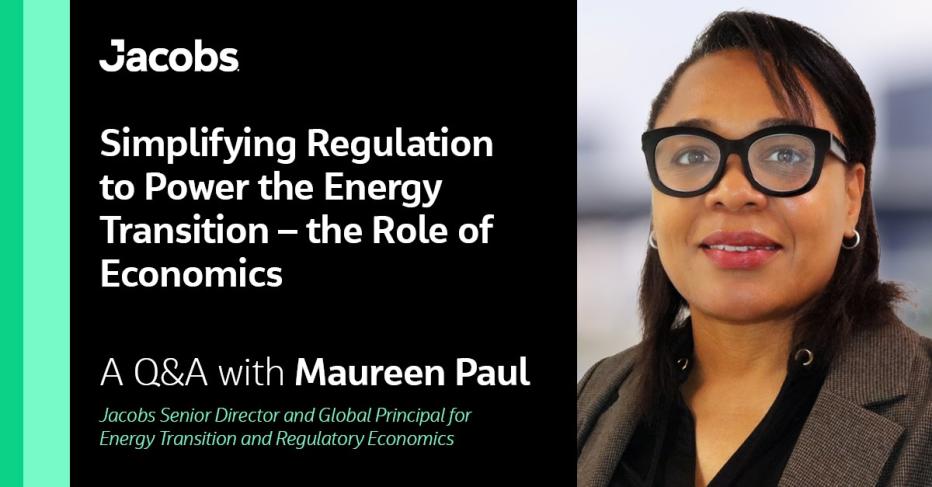
Regulations and policies often create uncertainty.
But not for Dr. Maureen Paul. She excels in a world of rules and responsibilities, transforming complexity into clarity and empowering her clients to make informed, confident decisions.
Maureen brings extensive experience in behavioral economics and regulatory leadership from key roles at Ofgem, the Competition Commission, and other organizations. She uses this expertise to translate technical regulations into actionable insights.
She’s also a leader in equity and inclusion, spearheading initiatives like the first professional economist apprenticeship. Today, Maureen is applying her strategic skills at Jacobs to support the global energy transition through innovation and informed regulation.
In this Q&A, Maureen shares how she helps clients simplify the evolving energy landscape to make effective decisions.
What are the biggest challenges for clients in the energy sector?
The greatest one is operating in a regulatory environment that is undergoing rapid and complex transformation while still being expected to deliver at a lower cost.
To succeed, businesses need an environment where investment is a national priority, championed by government, incentivized by regulation, and trusted by the public. That’s the ambition behind the recent UK Infrastructure: A 10 Year Strategy. However, the current system is under unprecedented pressure. The push to meet the Clean Power 2030 goal and the 2050 Net Zero target has triggered sweeping reforms across policy and regulation—all happening simultaneously. This creates both opportunity and uncertainty.
Traditionally, energy regulation in the U.K. has prioritized stability and predictability. But we now live in a “polycrisis” era, where global shocks—geopolitical, economic, or environmental—can destabilize the energy system overnight. The challenge is no longer just about navigating existing rules but about adapting to a world where regulation itself is becoming a living, evolving system.
Add in a growing mismatch between regulatory and innovation cycles, which exacerbates the challenge. Technologies like battery storage, gas generation, and AI-driven grid management evolve far faster than regulatory frameworks can respond—creating a “regulatory drag” that could stifle progress.
This all demands agility driven by evidence-based decision-making. Companies must invest ahead of the curve while building resilience into both current and future supply chains. They must also adapt to a new planning landscape: the creation of the National Energy System Operator (NESO) and the Strategic Spatial Energy Plan (SSEP) it is developing, signals a shift toward centralized, long-term planning. While designed to give greater clarity to industry, investors, consumers, and the public about the future shape of the energy system - something vital to optimising the transition to clean energy and driving economic growth - this top-down approach has to work in sync with the need for market dynamism and innovation. At the same time, businesses must navigate increasing complexity at the local level. Regional Energy Strategic Plans (RESPs) are emerging alongside national strategies, requiring companies to align with both local priorities and national goals.
And to top it off, the recent decision on the Review of Electricity Market Arrangements (REMA) to retain a single national wholesale electricity market as opposed to zonal pricing has left the question “what next” up in the air, including how the SSEP and the RESPs will interface with this decision.
Businesses must come to terms with the complexity that surrounds policy and regulatory change and learn to thrive in a system that is constantly evolving, where adaptability, foresight, and collaboration, anchored in real-world solutions, are essential.
That’s why economic insights that reflect real-world complexities are essential to creating a structured and transparent approach to decision-making. They help balance competing pressures and reveal which actions deliver the greatest value for a given objective. This includes analyzing the conflicting economic incentives within the sector to identify practical, forward-looking solutions.
For me, this means drawing on my background in regulatory frameworks, including those from adjacent sectors like water, to guide clients and contribute meaningfully to policy debates. Increasingly, I see the value in using evidence-based economic analysis to clarify the boundary between regulatory prescription and professional judgment. This allows us to apply creativity and pragmatism where principles allow flexibility.
What are the key ingredients for a successful global energy transition?
Regulatory clarity, collaboration, and public support.
To unlock the significant investment needed in clean technology (such as renewables, storage and smart grids), we need regulatory clarity and alignment that provides the right incentives and risk mitigation. Transparency is essential to avoid unnecessary complexity and conflicting incentives. When investors have a clear view of risks and returns, they can make informed decisions and foster greater market stability. The economics must make sense for them.
However, these decisions can’t be made in silos. The transition presents both opportunities and challenges, including competition for funding (for example, Contracts for Difference - CfD), market share, and influence over the future energy landscape. Yet, collaboration is just as critical—especially in decentralized generation, distribution, and the use of artificial intelligence to make energy systems smarter, more efficient, and more resilient. Sharing best practices and insights across the sector and across borders accelerates innovation and delivers broader benefits, from environmental gains to social impact.
Talent is another critical issue. The sector is grappling with a shortage of skilled labor. Addressing this requires a coordinated effort among schools, universities, businesses and governments to build a robust pipeline of future talent through new and inclusive pathways.
Finally, we must win hearts and minds. That’s where behavioral economics is important. The energy transition is costly and affects everyone. Public support is essential—but it’s hard to inspire change when the benefits aren’t immediately tangible and the language isn’t accessible. That’s why companies must lead with compelling storytelling and strategic stakeholder engagement, clearly communicating the impact and purpose behind the transition.
What opportunities are you most excited about in your field?
The opportunity to help the energy sector—both in the U.K. and globally—cut through the noise of competing debates and deliver actionable, grounded guidance is exciting and deeply meaningful. This is where Jacobs excels: translating complex regulatory discussions into practical, implementable solutions. A key area of focus for us is helping clients navigate the uncertainty that arises from regulatory misalignment, which can delay everything from infrastructure delivery to compliance.
Currently, regulators in various sectors operate with overlapping or potentially conflicting mandates. We're having conversations with stakeholders at both national and sectoral levels to explore ways to address misalignments, enabling faster and more coordinated progress across the energy landscape.
Also, digitalization and AI are powerful forces reshaping how we work, how energy markets function, and how sectors connect across borders.
These allow the industry to unlock new levels of efficiency and integration. I’m particularly excited about how they can empower local communities. By turning national ambitions into tailored, place-based action, we can ensure the energy transition is both inclusive and effective.
Equally important is embedding a just transition into everything we do: no community should be left behind. That’s why Jacobs’ team of regional economists plays a vital role—ensuring national decisions reflect the diverse realities of local communities and deliver equitable outcomes.
About the interviewee

Dr. Maureen Paul is a highly respected economist with a distinguished career spanning leadership roles across the public and private sectors. She’s worked with two of the world’s top four consulting firms, the Competition Commission, the Office of Fair Trading and the Office for Gas and Electricity Markets (Ofgem), Great Britain’s energy regulator. She was also one of the inaugural commissioners of the Caribbean Competition Commission.
Maureen bridges strategic thinking with practical application of analysis, helping to shape policies that deliver economic, social, and environmental benefits. At Ofgem, she spearheaded pioneering initiatives, including the distributional and decarbonization impact frameworks, a new methodology for assessing effective competition in energy markets, and the launch of Ofgem’s first professional economist apprenticeship and a mentorship program with the University of Greenwich.
Known for her ability to simplify complexity and drive inclusive change, Maureen brings a strategic, practical, flexible and solution-centered approach to regulation and innovation in the energy sector.












































